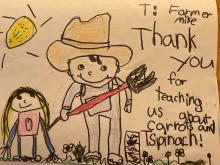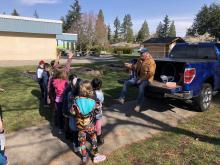Time to stop talking and start doing
From the Delta Optimist......
We have all heard by now that the average age of farmers in Canada is increasing. In British Columbia, this benchmark is approaching 57.
There are some encouraging signs that younger people, especially women, are searching out farming opportunities that are not of typical size and scope of more traditional large-scale farming operations.
In any agriculture plan, be it municipal, provincial or federal, education is always identified as a key pillar for developing long-term sustainable farming operations, regardless of size. Worldwide, there are some organizations that are working hard to educate children about farming, food and nutritional health.
With cases of childhood obesity and Type 2 diabetes growing continually, the time has come for governments, private businesses and agencies to work together on a cohesive plan to engage our youth and show them the value farming.
The Jamie Oliver Foundation, based in London, England, and the Edible Schoolyard Project, based in Berkley, California, are two of the most well-known agencies whose sole purpose is to teach kids how to grow, harvest and eat their own food.
We are surrounded by farming operations in our community, yet succession challenges are proving problematic to maintain the family farm. The recognition that it is important to educate new generations of farmers is a good step that has generally been ignored.
In British Columbia, the food economy is a large contributor to our overall GDP. There was once a time when agriculture was considered a primary resource along with forestry, mining and fishing. Times have changed, yet the need for a supply of fresh, locally sourced food has never been greater.
We are lucky here in Delta in that we have a school district that is constantly seeking innovation to fulfill its "bold vision." Children in our district have been afforded the opportunity to grow, harvest and eat their own food on school farms in the Project Pickle program. They are learning life lessons that will assist them in making wise food choices in the future and they are developing skills they will be able to pass on to their children.
In September of this year, the Delta district will once again innovate and offer senior secondary students the opportunity to participate in a "mini-school" based around farming and agriculture at the old Boundary Beach Elementary site.
Called Farm Roots Mini School, participating grade 10, 11 and 12 students will spend one day at their regular high school and then the second day at the mini school to study courses in the classroom and build farming operations on district-owned land at the site.
Courses designed around environmental and agricultural sciences are being co-developed with Kwantlen Polytechnic University and will be finalized shortly.
With Project Pickle as an incubator, it is expected the mini school will be well attended in coming years.
There are an abundance of jobs and careers related to farming and the food economy. As food becomes an increasingly valuable commodity, it is important that we have the bodies ready and able to carry on with maintaining the industry.
Programming in Delta shows we are committed and doing our part.
To learn more, there will be a Farm Roots open house on Saturday, Feb. 13 from 1 to 4 p.m. at Boundary Beach Elementary. Bring your kids.
Mike Schneider is founder of Project Pickle and likes to write about growing, cooking and eating food.
© 2016 Delta Optimist





Comments
Add new comment